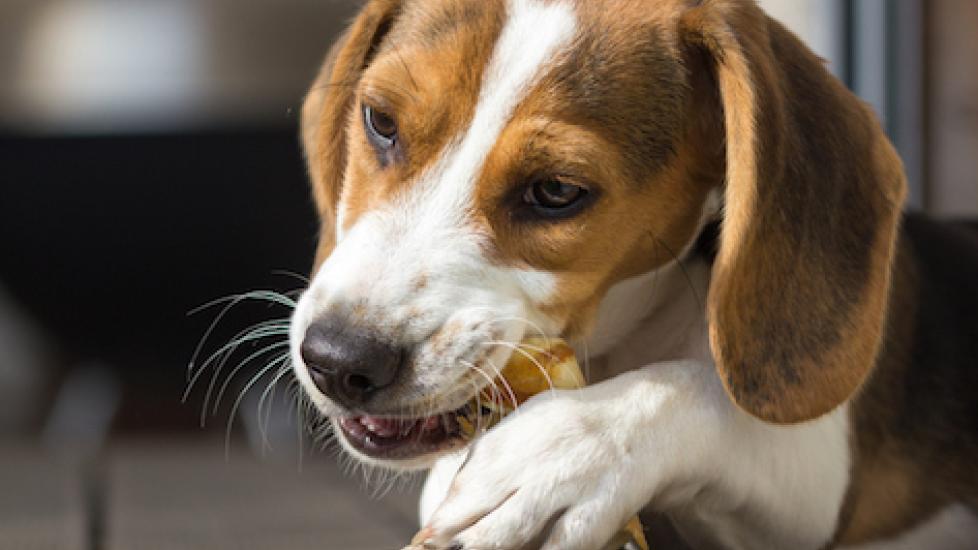5 Common Causes of Choking in Pets
When a dog or cat chokes, it can be a scary situation for any pet parent. Fortunately, if you know the most common choking hazards in pets, then you can get your pet the help she needs and, in some cases, prevent choking all together. Here are five common causes of choking in pets.
Foreign Objects
Curious dogs and cats explore their world by tasting and chewing, but sometimes they bite off more than they can chew. A dog can accidentally inhale whatever they are chewing on, and that can cause choking. Choking hazards include chew toys, balls, rawhides, bones, sticks, etc.—basically anything that is smaller than the windpipe or back of the throat can get stuck. It is a good idea to only let your dog chew on rawhides and toys under supervision, and take away the toy or rawhide when your dog chews it down small enough to swallow.
If your dog appears to be choking on a toy or rawhide, keep calm. A dog who is suffocating will panic and may accidentally bite. Avoid bite wounds and never put your hand in your dog’s mouth to retrieve the item. If your dog can still breathe, take your dog to your nearest veterinarian or veterinary emergency center immediately. If your dog can’t breathe, use the Heimlich maneuver to remove the item.
If your dog passes out, then and only then should you open the mouth and see if you can remove the item. Use both hands to open the mouth, and grasp the upper jaw while pressing the lips over the dog’s teeth so they are between the teeth and your fingers. Look inside your dog’s mouth and remove the obstruction if possible. If you can’t remove the object, try using a flat spoon to pry it out of the dog’s mouth.
Cats like to chew on and swallow string, which can cause choking if the string gets wrapped around their tongue. Veterinarians recommend storing all string and yarn out of reach of cats, and if you do play with your cat with feathered fishing poles or other string toys, store the toys out of reach when you are not actively playing with your cat.
Cats and dogs are also known to chew on electrical cords, and while electrocution doesn’t technically cause choking, it can cause pulmonary edema, which fills the lungs with fluid and restricts oxygen exchange. If you have a chewer, keep them safe by preventing any access to electrical cords.
Collapsing Trachea
Collapsing trachea is a common cause of choking in older small breed dogs. The trachea is the C-shaped cartilaginous windpipe that connects the nose and mouth with the lungs. In some small breeds, the windpipe becomes floppy, and the harder a dog sucks air in the trachea, the more collapsed it becomes, causing the dog to cough, sputter, and choke.
While there are some experimental procedures being tested at veterinary schools, at the time of writing, there is no cure for collapsing trachea. But if your dog has been diagnosed with a collapsing trachea, there are steps you can take to minimize the condition’s impact on quality of life. The most helpful recommendations are to keep a dog thin and cool, as excessive body weight and heat exacerbate the condition. If your dog is still struggling, talk with your veterinarian about getting cough medicine. If you are getting a puppy, talk with the breeder about the health of the mother and father, and ask if they have any problems. If the breeder doesn’t know, buy from a different breeder.
Infectious Disease
Kennel cough, also called infectious tracheobronchitis, is a highly contagious infectious respiratory disease in dogs that can mimic the signs of choking. Kennel cough is a catch-all term for several infectious organisms, and dogs catch it from other dogs or from sniffing up sputum coughed up by other dogs, much like you catch the common cold from somebody who sneezes on you. Kennel cough causes dogs to hack and cough like they have something caught in their throat. Sometimes affected dogs will spit up foam. Kennel cough is easily treated with antibiotics and cough medicine. You can prevent your dog from getting kennel cough by staying up-to-date on yearly bordetella vaccinations.
Another disease that can cause choking in dogs is puppy strangles. Puppy strangles is seen in young dogs, and the cause is unknown. Puppy strangles causes the swelling of the throat and lymph nodes, and flu-like symptoms.
Feline Asthma
Cats can develop hacking, coughing, labored breathing, and choking from asthma, which causes choking from constricted airways. Feline asthma is an allergic disease, caused by reactions to environmental allergens, such as dust mites or pollen. Feline asthma is a chronic inflammatory condition and there is no cure, however, symptoms can be managed with medications and allergen avoidance.
Constricting Collars
An often overlooked cause of choking in dogs and cats is a collar that is too tight, or a collar that becomes tight when a dog pulls on the leash. Collars can quickly become too tight in fast-growing puppies and kittens, so make sure to check the collar often on puppies and kittens, and keep it loosened enough to slip two fingers under the collar. If your dog pulls excessively on the leash and then chokes and coughs, then she could benefit from being trained to stop pulling through the use of a head halter or harness that is specially designed to reduce pulling.
Help us make PetMD better
Was this article helpful?
